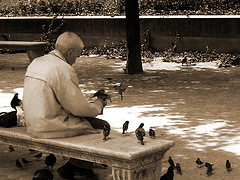 But first, the slacker birds. You know them. You’ve seen them. They flit from one bird feeder to the next, swilling millet, spilling sunflower seeds, covered in hulls and husks. Ever wondered about the ecological effects of feeding these backyard beauties? Well, Gillian Robb, Robbie McDonald, Dan Chamberlain, and Stuart Bearhop of various worthy institutes in the UK have published a research review in Frontiers in Ecology and the Environment, an online journal of the Ecological Society of America, as reported by AAAS. We dole out 500,000 metric tons of bird seed annually in the US and UK, supporting millions of songbirds. This researchers found that, though beneficial, the bonus seed may be a mixed blessing. From the abstract:
But first, the slacker birds. You know them. You’ve seen them. They flit from one bird feeder to the next, swilling millet, spilling sunflower seeds, covered in hulls and husks. Ever wondered about the ecological effects of feeding these backyard beauties? Well, Gillian Robb, Robbie McDonald, Dan Chamberlain, and Stuart Bearhop of various worthy institutes in the UK have published a research review in Frontiers in Ecology and the Environment, an online journal of the Ecological Society of America, as reported by AAAS. We dole out 500,000 metric tons of bird seed annually in the US and UK, supporting millions of songbirds. This researchers found that, though beneficial, the bonus seed may be a mixed blessing. From the abstract:
While alteration of the natural dynamics of food supply represents a major intervention in avian ecology, we have a remarkably limited understanding of the impacts of this widespread pastime… We consider positive impacts, such as aiding species conservation programs, and negative ones, such as increased risk of disease transmission. It seems highly likely that natural selection is being artificially perturbed, as feeding influences almost every aspect of bird ecology, including reproduction, behavior, demography, and distribution.
In one study, Robb and her colleagues found that dozens of blue tits that nibbled hand-out peanuts all winter fledged more chicks in the spring than those not fed. But a 2001 study of Florida scrub jays found that fed birds ate too much in winter and laid their eggs too early, so natural food sources weren’t available when the hatchlings needed them. The review hints at concerns about indirect impacts too. Namely that fed winter residents could be monopolizing all the good breeding territories and natural food supplies in the spring, outcompeting returning migrants.
On the plus side, feeders and nest boxes offer some swell opportunities for studying bird behavior. The Cornell Laboratory of Ornithology has launched some cool citizen-science web efforts:
Nest Cam, Cam Clickr, and NestWatch. You can get involved as much as you want. Voyeur, and catch up on the breeding behavior of Barn Owls. Watch high-def video and classify the behaviors. Or create your own scientific legacy by contributing data online. Your efforts will help monitor impacts of global climate change.
Julia Whitty is Mother Jones’ environmental correspondent, lecturer, and 2008 winner of the Kiriyama Prize and the John Burroughs Medal Award. You can read from her new book, The Fragile Edge, and other writings, here.














